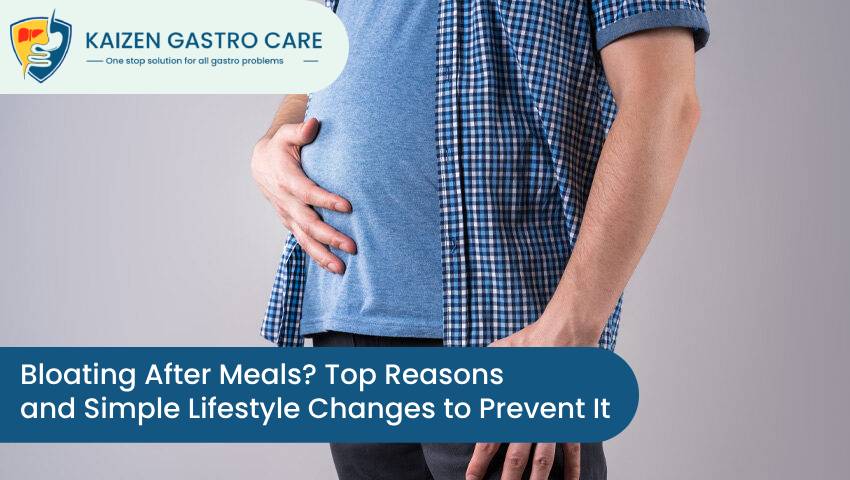
- 21/11/2024
- Kaizen Gastro Care
- 0 Comments
- Gut Health
Bloating After Meals? Top Reasons and Simple Lifestyle Changes to Prevent It
Bloating is an uncomfortable, often uncomfortable, sensation that makes many people feel full or swollen after eating. This common digestive issue can be caused by various factors and may lead to discomfort that affects daily life. If you’re struggling with post-meal bloating, understanding its causes and knowing how to make practical lifestyle changes can get substantial relief. The best gastroenterology clinic in Pune, Kaizen Gastro Care Clinic is here to help you understand the root causes and provide actionable steps to ease the bloat.
Common Causes of Bloating After Meals:
- Overeating: One of the easiest yet most common causes of bloating is eating too much at one time. Large portions of food can stretch the stomach, causing it to produce gas and leading to bloating.
- Eating Too Quickly: When we eat quickly, we tend to swallow more air, which can contribute to a bloated sensation. The body also has less time to signal fullness, making overeating more likely.
- Carbonated Drinks: Sodas and fizzy drinks contain carbon dioxide gas, which can get trapped in your digestive tract and lead to bloating. This effect is intensified if consumed along with a meal.
- High-Fiber Foods: While fiber is crucial for a healthy diet, certain high-fiber foods like beans, lentils, broccoli, and cabbage can produce gas and cause bloating, especially for individuals who aren’t used to them.
- Food Intolerances: Intolerances to specific foods, such as lactose in dairy or gluten in wheat, can trigger bloating. In these cases, the body struggles to break down certain components, leading to gas and bloating.
- Salt and Processed Foods: High-sodium foods and processed meals cause the body to retain water, which can add to bloating and make the gut feel tight.
- Gut Microbiome Imbalance: Imbalances in gut bacteria can lead to excessive gas production during digestion, contributing to bloating.
- Artificial Sweeteners: Sorbitol, xylitol, and other sugar substitutes are difficult for the stomach to digest. These sweeteners often pass into the large intestine undigested, where bacteria ferment them, creating gas and bloating.
- Lack of Digestive Enzymes: For some people, low levels of digestive enzymes make it challenging to break down food efficiently. Conditions like pancreatic insufficiency or bile acid insufficiency can lead to bloating after eating certain foods.
Simple Lifestyle Changes to Prevent Bloating:
If you’re dealing with regular bloating after meals, here are some effective lifestyle modifications to incorporate:
- Eat Smaller Portions: Try consuming smaller meals throughout the day rather than three large meals. Smaller portions are easier for the stomach to digest, minimizing the risk of bloating.
- Chew Slowly and Mindfully: Eating at a slower pace allows your body to digest food more efficiently and reduces the amount of air swallowed, which can reduce bloating.
- Limit Carbonated Beverages: Avoid or limit carbonated drinks, particularly with meals. Opt for water or herbal teas, which are gentler on the stomach.
- Gradually Increase Fiber Intake: If you’re introducing high-fiber foods into your diet, do so gradually. This allows your digestive system to adjust, reducing the likelihood of bloating.
- Identify Trigger Foods: If certain foods cause you to bloat consistently, consider tracking your diet to identify potential triggers. This can help you make informed choices and prevent future discomfort.
- Stay Hydrated: Drinking plenty of water helps digestion and can help flush out excess salt, which often contributes to bloating.
- Practice Regular Physical Activity: Exercise helps to stimulate digestion, lowering the chance of gas buildup and bloating.
- Consult a Gastroenterologist for Food Intolerances: If you suspect lactose, gluten, or another food intolerance, speak to a gastroenterologist for advice. Tests can help confirm food sensitivities, allowing you to tailor your diet for optimal digestive health.
- Incorporate Probiotics: Probiotics, found in yogurt and fermented foods, help maintain a healthy balance of gut bacteria. This balance can improve digestion and may help relieve bloating.
- Stay Active: Regular physical activity, even a short walk after meals, can promote digestion and help relieve bloating. Exercise also helps in releasing trapped gas in the digestive tract.
When to Seek Medical Advice?
Occasional bloating is normal, but if you experience it frequently or notice other symptoms like severe abdominal pain, weight loss, or blood in stools, it may signify an underlying gastrointestinal condition.
At Kaizen Gastro Care Clinic, our experts provide comprehensive care for digestive issues like bloating. We specialize in diagnosing the root cause of your symptoms and guiding you toward effective lifestyle adjustments or treatments to relieve bloating and improve your gut health.
Conclusion:
Bloating after meals can be painful, but with a few mindful changes, you can reduce its occurrence and enjoy meals with ease. By making small adjustments to your eating habits and being aware of trigger foods, you can support a healthier digestive system. If bloating persists, reach out to Kaizen Gastro Care clinic for professional bloating treatment in Pune and personalized care.
